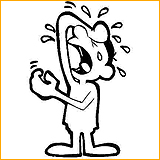| Mental Health Tips | |
| Common Mental Problems | |
| Substance Misuse | |
| Treatment of Mental Disorders | |
| Mental Health Education Pamphlets | |
 Depression
Depression
(Special thanks to Dr. William Chui of Institute of Mental Health, Castle Peak Hospital, for authoring this article)
Depression is a brain disease. In most cases, chronic stress in life leads to abnormally high level of stress hormone which is toxic to the brain. It damages the parts of the brain which regulate mood, motivation, memory, sleep and appetite etc. Therefore in depression, apart from persistently depressed mood, the symptoms also include loss of interest and energy, poor memory, disturbed sleep and appetite, losing confidence and even thought of suicide. There are effective treatments, both by antidepressant medications and psychological intervention, for a depressive disorder.
1. How common is depression?
2. What are the symptoms of depression?
3. What are the causes of depression?
4. How does stressful experience damage the brain and lead to depression?
5. How does an antidepressant treat depression?
6. How does psychological treatment treat depression?
1. How common is depression?
Depression affects about 5% of men and 10% of women in developed countries. In adult, the first episode of depression most likely happens between 30-40. In 2000, the World Health Organization predicted that 20 years later, depression would become the second biggest burden of disease, second to ischemic heart disease.
2. What are the symptoms of depression?
Depression is a mood disorder in which the core feature is a depressed mood. The depressed mood in a depressive illness is different from the feeling “sad” or “upset” which is a normal feeling in everyday life. A depression includes a much more complex emotion which includes sadness, anger and sometimes also shame and guilt. The person suffering from depression feels helpless and often has a strong feeling of self-blame or worthlessness. He loses the ability to experience pleasure, and therefore he can no longer enjoy pleasurable events. This experience is analogous to a blocked nose upon a common cold in which the ability to smell is lost and fresh flowers become scentless. He might even feel he would be better off dead or have thought of killing himself. The person is unable to lead himself out of this mood. The depressed mood exists for most time of a day and persists for more than 2 weeks
Apart from depressed mood and thinking negative, the person also has the following symptoms
- Loss of energy; marked loss of appetite leading to body weight loss; poor sleep with early morning awakening. However, some might have atypical features of marked excessive sleeping and increase of appetite.
- Psychomotor retardation or agitation; impaired ability to think or concentrate; being indecisiveness. In severe cases, hallucination and delusion might occur.
3. What are the causes of depression?
Like other mental illness, the external stressor and internal tendency towards the illness both contribute to the onset of depression. When a person who is born with a biological vulnerability in the brain is now being hit by an external stress (e.g. loss of relationship or a job), the brain fails to cope and breaks down. The situation is like an old car engine becomes overheat upon running uphill with a heavy load; when the certain temperature is reached, the engine breaks down and the car cannot run.
Genetic factor is important in vulnerability. If one of your parents or siblings suffers from the depression, your risk of having depression is 1.5 to 3 times higher than the general population. Apart from genes, environmental stressors play an even more important role in triggering depression. In most patients, the major environmental stressors are series of traumatic experiences, from loss of parents, neglect or abuse in childhood to break-down of relationship or setback in career in adult, which accumulate from childhood onwards. Direct toxic effect of chemical, most notably excessive use of alcohol, is also a common external stressor causing depression.
4. How does stressful experience damage the brain and lead to depression?
To understand how stress leads to brain damage, we have to understand how body reacts to stress. Upon a threat, our body will release “stress hormones” (one of them is cortisol) which make our body ready to fight, i.e. mind becoming more alert, blood pressure and heart rate going up, and blood sugar metabolism increasing. But too much stress hormone is toxic to our brain. When stress is too much and too long, the brain, especially the regions responsible for mood, sleep and memory, is damaged by the excessive amount of stress hormone. A child’s brain is more fragile; therefore, children are more susceptible to traumatic experience than adults. Traumatic experience in childhood, e.g. being abused or having loss of parents, causes excessive steroid hormone in body which damages the brain region for mood control. Therefore, a child with adverse childhood experience shows more difficulty in emotional regulation, e.g. more anxious, more easily being upset. Negative emotion leads to negative thinking, resulting in pessimism in personality which makes this child find things in life more stressful to him.
As they grow older and older, stress in life accumulates and their already-compromised brain is being damaged by the excessive steroid hormone day after day. In most cases, when one adverse event (e.g. breaking up with partner) happens and the brain is damaged to the point that it breaks down and becomes malfunctioning. Because the part of brain being damaged is responsible for mood as well as memory, sleep and appetite regulation etc, a person with depression has symptoms of depressed mood, as well as poor memory, disturbed sleep and appetite.
5. How does an antidepressant treat depression?
Among depressed patients, the nature of their environment stressors differ widely; it can be marital, work-related, financial etc. Nonetheless, the final common pathway is damage to the brain by stress hormone. In the involved part of the brain, a number of chemicals, such as serotonin and norepinephrine, are important for functioning. The transmission of serotonin is disrupted in the diseased part of the brain, leading to malfunction.
An antidepressant works by at least two ways. On one hand, it directly enhances the transmission of serotonin among the brain cells. On the other hand, it promotes the healing of damaged part of brain through a growth factor called brain-derived neurotrophic factor (BDNF). Stress hormones damage the brain by inhibiting the production of this brain growth factor, causing the brain cells to wither like the root of a plant drying up.
So we can see that unlike a comedy which makes you happy directly, an antidepressant is not a “happiness-creating” agent. An antidepressant heals your brain so that you regain the capacity to experience happiness. It also helps you to regain the ability to think rationally, to sleep well and have energy, so that you are more able to solve the life problems which cause you all the stress and your depression.
We can see that an antidepressant can be considered as a medication which heals and protects your brain against the damage from stress. Therefore, doctors generally recommend the patient to continue the antidepressant for a year or even longer after recovering from the first episode of depression, in order to consolidate the healing in brain. For those who have more than one episode of depression, they should continue the antidepressant for a few years or more, in order to prevent a recurrence.
6. How does psychological treatment treat depression?
Psychological treatments, particularly Cognitive Behavioural Therapy, have good evidence for their therapeutic effect in depression. In depression, the patient loses the capacity to experience pleasure, and the absence of pleasures in life creates an all-negative perspective for everything in life. By helping the patient to examine the current negative thinking and behavioural pattern; and to adopt new way of thinking and acting, positive experience can be accumulated in life so as to overturn the existing negative thinking and have a better mood. Just imagine, in a school examination, you came third in class; the level of stress (and the level of stress hormone) is very different by thinking in a positive (I am in the top three!) or negative way (I lost to 2 people). Similarly, how will you feel if a colleague does not acknowledge you when you wave a greeting? You can choose to think negatively (e.g. he does not like me, and I would avoid meeting him again) and bear a high level of stress. You can also choose to think positively (e.g. he is just busy with his work on desk, and I can chat with him when I meet him next time) and have much less stress.
Websites with relevant information / Reference
The Royal College of Psychiatrists|
================================================================================ Thank you for browsing the mental health tips on the IMH internet. We would like to hear feedback from you through the questionnaire below. Your comments are most welcome for our continuous improvement. |
No. of visitors of this page: 5673


